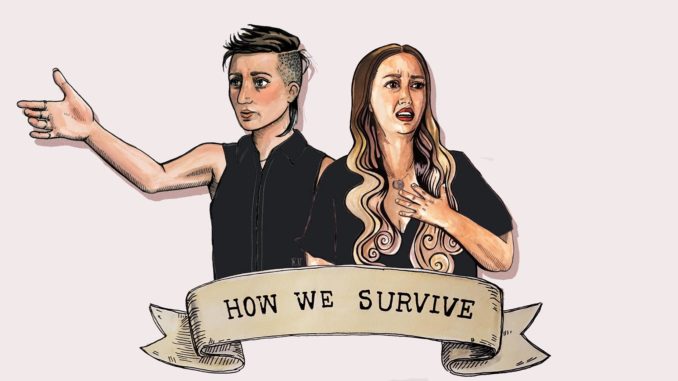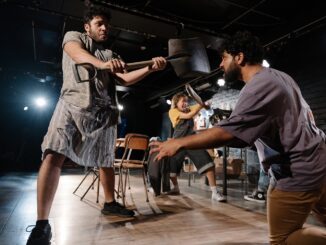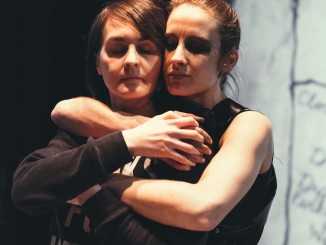
More Than Surviving: Two Artists, Thriving
How We Survive offers an expected array of feminist discourse – from abortion rights and the gender pay gap, to body image and how to crush the patriarchy – but personal anecdotes in the form of poems are delivered with such intoxicating and brave energy that audience members are left with new insight, hungry for more. For an hour and a half, audience members are led with comforting hands by Olivia Hall and Carrie Rudzinski, through an open space where no topic is off-limits and emotions are encouraged.
As we enter the studio, two comfortable chairs flank a coffee table adorned with feminist literature – Roxanne Gay’s Difficult Women and Clementine Ford’s Fight Like A Girl rest, perhaps surprisingly, beside Harry Potter and the Philosopher’s Stone. We are welcomed into the space before darkness descends, and an opening audio track of famous men and their misogyny makes us squirm before giving way to more inspirational words.
Within the first few minutes, in response to an explosive manifesto opening utilising the power of spoken unison, the room feels as if it is holding a collective breath. Only when I realise that both the women to my right and left have been moved to tears do I allow myself to experience the weight of emotions – anger, frustration and sadness – as Hall and Rudzinski recite a poem addressed to Brock Turner’s father and, surprisingly, to his young daughter. Our hosts demand to know if this parent would have fought for the same justice had his female progeny been found under the hands of another ‘Stanford Swimmer.’ For audience members who aren’t regulars at what Rudzinski’s male colleague once referred to as the ‘You All’ feminist club (wherein women meet under the cover of darkness to discuss elaborate plots to overthrow the patriarchy), handy informal introductions elaborate on the show’s topics. Hall, a Kiwi in her early twenties who currently lives in London, tells us she is studying towards a degree in gender studies; through a plethora of material, we realise how Hall’s experiences have shaped her feminism. Hall tearfully admits that she’s toyed with the idea of axing the next poem but needs to recite it because she’s often approached by audience members who’ve had similar experiences – of excruciating discomfort during intercourse. Hall gives a frank description of living with vaginismus, a condition which often means sex is unbearably painful. She rhythmically recounts the years in which she was dismissed by medical professionals, or told it was something she – and many other young women – simply have to endure.
Rudzinski humbly describes herself as a poetry teacher from Illinois, America, who now lives in South Auckland. Her ‘Hype Poem’ doesn’t mention her grand accolades, namely how she ranked 4th at the Women of the World Poetry Slam, but she takes pride in other modest wins – like how her long-term partner now owns a pair of shorts. That particular quip, taken from ‘Love Poem After Seven Years,’ typifies the abundant humour within the original material and how readily Hall and Rudzinski write from life and bare their souls.
Pressed to provide criticism, I would highlight the lack of perspectives of, and about intersectional feminists (women of colour and those on the LGBTQI+ spectrum) save from the brief use of audio clips in the introduction referencing Maya Angelou and Sandra Bland – a 28 year old African-American woman found hanged in her jail cell three days after being arrested during a traffic stop. I was also surprised that the poem about Brock Turner hadn’t been further reframed to include Chanel Miller’s perspective, in the wake of her recently published authored account.
However, in the same breath, I would stress the final messages within How We Survive: an acknowledgement that there is no such thing as the perfect feminist, or perfect woman – or perfect feminist poetry slam – and that the pressure of perfection is yet another weapon of the patriarchy, used against us to divide and rule.
Successfully falling short of perfection, Hall and Rudzinski have created a near-masterpiece of imperfection – a window into the specific worlds of two women, raw flaws on show, unabashed and rightfully unapologetic.
And the Harry Potter book? Well, in case you didn’t know, Hermione Granger is a feminist icon. Hall and Rudzinski’s ode to her and the world-famous series demonstrates how female role models can positively impact young women – and it’s safe to say Hall and Rudzinski will continue to inspire their fair share, too.
How we Survive plays Basement Theatre until 2 November.




Leave a Reply